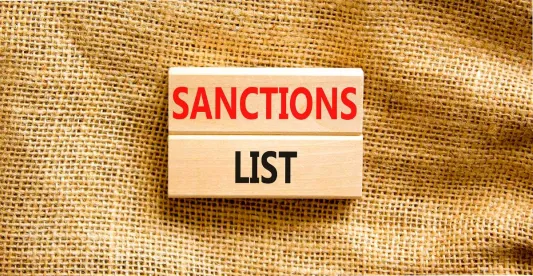U.S. sanctions and other restrictions on Ethiopia and Eritrea may persist despite a recent peace deal between the Ethiopian government and the Tigray People’s Liberation Front. The deal purports to end hostilities in an armed conflict that has killed hundreds of thousands, displaced millions, and contributed to a severe hunger crisis.1 If implemented, this agreement could resolve the human rights and humanitarian concerns that have been the basis for several measures the United States has taken against Ethiopia and Eritrea, including sanctions, trade restrictions, and visa restrictions. Until a peace deal proves durable, current restrictions by the United States — and by other countries — will continue to create uncertainty for investors and persons seeking to do business in or with Ethiopia, Eritrea, and the Greater Horn of Africa region.
Background
Ethiopia’s governing regime, led by Prime Minister Abiy Ahmed Ali, has engaged in an armed conflict with Tigrayan forces for two years.2 Tigray, a northern region of Ethiopia, has in recent history held strong influence over the entire country, with the Tigray People’s Liberation Front (TPLF) controlling the national government from 1991 until Abiy was elected prime minister in 2018.3 In November 2020, following disputed local elections and reports of violence in Tigray, the Abiy regime began carrying out military operations in the region.4 Tigrayan forces responded by threatening to capture Addis Ababa.5 Forces from neighboring Eritrea and from Ethiopia’s Amhara region joined the conflict on the side of the federal government.6
Current U.S. Sanctions & Restrictions Regime
In response to the conflict, the United States enacted several measures that remain in place today:
-
In May 2021, Secretary of State Antony Blinken announced visa restrictions for Ethiopian and Eritrean officials, military personnel, and other individuals “responsible for, or complicit in, undermining resolution of the crisis in Tigray."7 The State Department did not announce the names of restricted individuals. The State Department’s Directorate of Defense Trade Controls (DDTC) began implementing a policy of prohibiting the export of defense articles and services to Ethiopia.8
-
In August 2021, the U.S. Treasury Department’s Office of Foreign Assets Control (OFAC), citing human rights abuses in Tigray, designated General Filipos Woldeyohannes, the Eritrean army’s chief of staff, as a target for sanctions under Executive Order 13818.9 President Donald Trump had issued E.O. 13818 in 2017 as part of the Global Magnitsky Act, authorizing sanctions against individuals responsible for human rights abuses and corruption around the world.10
-
In September 2021, President Joe Biden issued Executive Order 14046, authorizing sanctions against entities and individuals responsible for “widespread violence, atrocities, and serious human rights abuse” in Ethiopia.11 OFAC did not yet designate any targets for sanctions under E.O. 14046. These sanctions later were codified in the Ethiopia Sanctions Regulations.12
-
In November 2021, DDTC formally amended the International Traffic in Arms Regulations (ITAR), codifying DDTC’s policy of denying licenses for exporting defense articles or services “to or for the armed forces, police, intelligence, or other internal security forces of either Ethiopia or Eritrea."13
-
Also in November 2021, pursuant to E.O. 14046, OFAC designated four Eritrean entities and two Eritrean individuals as targets for sanctions.14 The entities were:
-
The Eritrean Defense Force;
-
The People’s Front for Democracy and Justice (PFDJ, Eritrea’s sole legal political party);
-
The Hidri Trust (a holding company affiliated with PFDJ); and
-
The Red Sea Trading Corporation (a business management company affiliated with PFDJ).
-
-
The individuals were:
-
Abraha Kassa Nemariam, the head of the Eritrean National Security Office; and
-
Hagos Ghebrehiwet W Kidan, the economic advisor to the PFDJ and C.E.O. of the Red Sea Trading Corporation.15
-
-
In January 2022, the Office of the U.S. Trade Representative, citing human rights violations, terminated Ethiopia from the Africa Growth and Opportunity Act trade program, ending the country’s duty-free access to American markets.16 The program had generated employment for 100,000 Ethiopians and had earned the country $100 million annually.17
Implications on the Telecommunications Industry in the Region
Following Blinken’s May 2021 announcements, some reports18 indicated the U.S. International Development Finance Corporation (DFC) — citing violence, human rights abuses, and atrocities associated with the Tigray conflict — was delaying or suspending its previously announced19 $500 million loan to a consortium of companies to develop a private telecommunications network in Ethiopia.20 Ethiopia’s government controls the telecommunications sector through a monopoly corporation, which had opened the bidding in 2020 for telecommunication service providers to enter Ethiopia’s market for mobile phone development.21 The DFC’s reported delays raised serious concerns for investors, as they potentially jeopardized a deal set to introduce Ethiopia’s population of more than 115 million to the international telecommunications marketplace for the first time.22 The delays also raised the possibility that a China-backed competitor consortium would win license to the market instead.23
Looking Forward & Navigating the Regime of U.S. Sanctions and Restrictions
U.S. officials have praised the November 3, 2022 peace deal as a diplomatic achievement.24 Under its terms, Tigray and the federal government are to cease hostilities permanently, Tigray will disarm within 30 days, and the federal government will take back control of Tigray infrastructure and allow humanitarian aid to access the region.25 On November 12, amid concerns that humanitarian workers still could not reach people in need,26 Tigray and federal leaders made another agreement clarifying the implementation of the peace deal.27 November 15 saw the first humanitarian aid convoy arrive in Tigray’s capital since last August.28
Despite these developments, foreign policy analysts question the stability of the truce. Some suggest the terms of the peace deal too heavily disfavor the Tigrayans for them to continue to implement it.29 Analysts also note that Eritrea and the Amhara region of Ethiopia, both of which go unmentioned in the peace deal, still have their own motivations for continuing the fight against Tigray.30 A previous ceasefire agreement did not stand the test of time.31
Key Takeaways
OFAC’s sanctions designations under E.O. 13818 and E.O. 14046 remain in effect, and OFAC retains authorization to make further designations.32 Except for entities authorized by a general or specific license issued by OFAC or who are otherwise exempt, OFAC’s regulations generally prohibit all transactions by U.S. persons or within (or transiting) the United States that involve any property or property interests of designated or otherwise blocked persons.33 These restrictions can extend to non-U.S. persons who engage in dollar-denominated transactions. The prohibitions include contributing or providing funds, goods, or services by, to, or for the benefit of any blocked person or receiving any funds, goods, or services from any such person.34
Other lingering effects of U.S. measures may present mixed signals for investors in the region’s emerging markets. Ethiopia remains excluded from the AGOA trade preference program, and the State Department’s restrictions on visas and defense exports remain in place. Despite the reported delays with DFC’s loan, the U.S.-backed consortium of telecom companies began providing services in Addis Ababa in October 2022.35 The United States continues to provide humanitarian aid to Ethiopia, giving more than $1 billion in Fiscal Year 2021 to promote health, food security, basic education, support for women and girls, and human rights and democracy.36
2021 Foley & Lardner LLP Summer Associate Maddison Craig contributed to the drafting and research of this article.
FOOTNOTES
1 See Ethiopia Peace Deal Hailed As a ‘New Dawn,’ Al Jazeera, Nov. 3, 2022, https://www.aljazeera.com/news/2022/11/3/how-did-the-world-react-to-the-ethiopia-peace-deal; see also A Peace Deal Highlights the Pointlessness of Ethiopia’s War, The Economist, Nov. 4, 2022, https://www.economist.com/middle-east-and-africa/2022/11/04/a-peace-deal-highlights-the-pointlessness-of-ethiopias-war; see also Declan Walsh, Abdi Latif Dahir, and Lynsey Chutel, Ethiopia and Tigray Forces Agree to Truce in Calamitous Civil War, The New York Times, Nov. 2, 2022, https://www.nytimes.com/2022/11/02/world/africa/ethiopia-tigray-civil-war.html.
2 See War in Ethiopia, Council on Foreign Relations – Global Conflict Tracker, last updated October 20, 2022, https://www.cfr.org/global-conflict-tracker/conflict/conflict-ethiopia.
3 See id.
4 See id.
5 See Declan Walsh and Simon Marks, Ethiopia Declares State of Emergency as Rebels Advance Toward Capital, The New York Times, Nov. 2, 2021, https://www.nytimes.com/2021/11/02/world/africa/ethiopia-state-of-emergency.html.
6 See Two Years of Ethiopia’s Tigray Conflict: A Timeline, Al Jazeera, Nov. 10, 2022, https://www.aljazeera.com/news/2022/11/10/two-years-of-ethiopias-tigray-conflict-a-timeline.
7 Press Statement, U.S. Dep’t of State, United States’ Actions To Press for the Resolution of the Crisis in the Tigray Region of Ethiopia (May 23, 2021), https://www.state.gov/united-states-actions-to-press-for-the-resolution-of-the-crisis-in-the-tigray-region-of-ethiopia/; Immigration and Nationality Act § 212(a)(3)(c), 8 U.S.C § 1182.
8 See Ethiopia –Related Sanctions, U.S. Department of the Treasury, Nov. 21, 2022, https://home.treasury.gov/policy-issues/financial-sanctions/sanctions-programs-and-country-information/ethiopia; see also 22 C.F.R. Part 126, available at: /https://www.pmddtc.state.gov/sys_attachment.do?sysparm_referring_url=tear_off&view=true&sys_id=b1aa9d351b2b74102b6ca932f54bcb4c.
9 Press Release, U.S. Dep’t of Treasury, Treasury Sanctions Eritrean Military Leader in Connection with Serious Human Rights Abuse in Tigray (Aug. 23, 2021), https://home.treasury.gov/news/press-releases/jy0329#:~:text=WASHINGTON%20%E2%80%94%20Today%2C%20the%20U.S.%20Department,rights%20abuse%20committed%20during%20the.
10 Exec. Order 13818, Blocking the Property of Persons Involved in Serious Human Rights Abuse or Corruption, Dec. 20, 2017, https://home.treasury.gov/system/files/126/glomag_eo.pdf; see also 31 C.F.R. pt. 583; Michael A. Weber, The Global Magnitsky Human Rights Accountability Act, Congressional Research Service, Dec. 3., 2021, https://crsreports.congress.gov/product/pdf/R/R46981/1.
11 Exec. Order 14046, Imposing Sanctions on Certain Persons With Respect to the Humanitarian and Human Rights Crisis in Ethiopia, Sept. 17, 2021, https://home.treasury.gov/system/files/126/14046.pdf; see also 31 C.F.R. pt. 550.
12 31 C.F.R. Part 550.
13 International Traffic in Arms Regulations: Addition of Ethiopia and Amendment to Eritrea Country Policy, Federal Register, Nov. 1, 2021, https://www.federalregister.gov/documents/2021/11/01/2021-23450/international-traffic-in-arms-regulations-addition-of-ethiopia-and-amendment-to-eritrea-country; 22 C.F.R. 126.1(c)(3).
14 Press Release, U.S. Dep’t of Treasury, Treasury Sanctions Four Entities and Two Individuals in Connection with the Crisis in Ethiopia (Nov. 12, 2021), https://home.treasury.gov/news/press-releases/jy0478.
15 Id.
16 Press Release, Office of U.S. Trade Rep., U.S. Terminates AGOA Trade Preference Program for Ethiopia, Mali and Guinea (Jan. 1, 2022), https://ustr.gov/about-us/policy-offices/press-office/press-releases/2022/january/us-terminates-agoa-trade-preference-program-ethiopia-mali-and-guinea.
17 Vanda Felbab-Brown, The Exemplary U.S. Sanctions Regime for Ethiopia’s Tigray Conflict and Its Limitations, The Brookings Institution, Oct. 1, 2021, https://www.brookings.edu/blog/order-from-chaos/2021/10/01/the-exemplary-u-s-sanctions-regime-for-ethiopias-tigray-conflict-and-its-limitations/.
18 See, e.g., U.S. Ban Dims Safaricom Loans for Ethiopia Entry, Business Daily, July 15, 2021, https://www.businessdailyafrica.com/bd/corporate/companies/us-ban-dims-safaricom-loans-ethiopia-entry-3473806.
19 Press Release, U.S. Int’l Development Finance Corp., DFC Approves over $2.1 Billion in New Investments for Global Development (Dec. 10, 2020), https://www.dfc.gov/media/press-releases/dfc-approves-over-21-billion-new-investments-global-development.
20 The consortium included Safaricom, Vodacom, Sumitomo, and CDC. See U.S. Ban Dims Safaricom Loans for Ethiopia Entry, Business Daily, July 15, 2021, https://www.businessdailyafrica.com/bd/corporate/companies/us-ban-dims-safaricom-loans-ethiopia-entry-3473806.
21 See Samuel Gebre and Loni Prinsloo, U.S. Sanctions Muddle Vodafone Funding for Ethiopian Entry, BLOOMBERG LAW, May 24, 2021, https://www.bloomberg.com/news/articles/2021-05-24/u-s-sanctions-complicate-vodafone-funding-for-ethiopia-entry?leadSource=uverify%20wall#xj4y7vzkg.
22 See id.
23 See U.S. Ban Dims Safaricom Loans for Ethiopia Entry, Business Daily, July 15, 2021, https://www.businessdailyafrica.com/bd/corporate/companies/us-ban-dims-safaricom-loans-ethiopia-entry-3473806.
24 See, e.g., Press Statement, Antony Blinken, U.S. Dep’t of State – U.S. Embassy in Ethiopia, On the African Union-Led Peace Talks (Nov. 2, 2022), https://et.usembassy.gov/on-the-african-union-led-peace-talks/.
25 See Cara Anna, Ethiopia Asserts Government Got ‘100%’ in Tigray Peace Deal, Associated Press, Nov. 3, 2022, https://apnews.com/article/africa-business-kenya-ethiopia-disarmament-b3125804f019f01f226e2d103aa4c63e?utm_source=ActiveCampaign&utm_medium=email&utm_content=Is+Ethiopia+s+Bloody+Civil+War+at+an+End%3F&utm_campaign=%3Cstrong%3EIs+Ethiopia+s+Bloody+Civil+War+at+an+End%3F%3C%2Fstrong%3E.
26 See Jason Burke, Tigray Still Without Aid Eight Days After Deal to End Ethiopia’s Blockade, The Guardian, Nov. 10, 2022, https://www.theguardian.com/world/2022/nov/10/tigray-without-aid-eight-days-after-deal-end-ethiopia-blockade.
27 See Ethiopia, Tigray Military Leaders Agree on Peace Roadmap, Associated Press, Nov. 12, 2022, https://apnews.com/article/africa-kenya-nairobi-ethiopia-government-and-politics-e119abe320663a68c3a10ba07331acb8; Press Statement, U.S. Dep’t of State, Resumption of Humanitarian Assistance to Northern Ethiopia (Nov. 12, 2022), https://www.state.gov/resumption-of-humanitarian-assistance-to-northern-ethiopia/.
28 See ICRC: Humanitarian Convoy Arrives in Ethiopia’s Tigray, Associated Press, Nov. 15, 2022, https://apnews.com/article/africa-ethiopia-abiy-ahmed-3796944fa3625e6f2c626dc5d11c3e47?utm_source=dailybrief&utm_medium=email&utm_campaign=DailyBrief2022Nov16&utm_term=DailyNewsBrief.
29 See, e.g. Christina Lu, Ethiopia’s Perilous Path to Peace, Foreign Policy, Nov. 14, 2022, https://foreignpolicy.com/2022/11/14/ethiopia-war-peace-deal-truce-tigray-humanitarian-crisis/.
30 See, e.g., Abdi Latif Dahir, Details in Ethiopia’s Peace Deal Reveal Clear Winners and Losers, The New York Times, Nov. 3, 2022, https://www.nytimes.com/2022/11/03/world/africa/ethiopia-tigray-civil-war-agreement.html; Mohamed Kheir Omer, How Eritrea Could Derail the Ethiopian Peace Deal, Foreign Policy, Nov. 10, 2022, https://foreignpolicy.com/2022/11/10/how-eritrea-could-derail-the-ethiopian-peace-deal/.
31 A March 2021 ceasefire agreement broke down in August. See Ellen Ioanes, A Peace Deal Could End Ethiopia’s Brutal Civil War. Can a Truce Last?, Vox, Nov. 3, 2022, https://www.vox.com/world/2022/11/3/23438725/ethiopia-tigray-peace-deal-cessation-hostilities
32 OFAC’s authority to sanction entities and individuals pursuant to E.O. 13818 may end in December 2022. In December 2021, Biden extended for one year the national emergency declared in E.O. 13818. See Presidential Action, The White House, Notice on the Continuation of the National Emergency with Respect to Serious Human Rights Abuse and Corruption (Dec. 16, 2021), https://www.whitehouse.gov/briefing-room/presidential-actions/2021/12/16/notice-on-the-continuation-of-the-national-emergency-with-respect-to-serious-human-rights-abuse-and-corruption/.
33 See, e.g., Press Release, U.S. Dep’t of Treasury, Treasury Sanctions Four Entities and Two Individuals in Connection with the Crisis in Ethiopia (Nov. 12, 2021), https://home.treasury.gov/news/press-releases/jy0478.
34 See, e.g., id.
35 See Press Release, Vodafone, Safaricom Ethiopia Switches on Its Network and Services in Addis Ababa (Oct. 6, 2022), https://www.vodafone.com/news/services/safaricom-ethiopia-switches-its-network-services-addis-ababa.
36 See Press Release, U.S. Agency for Int’l Development, USAID Providing More Than $39 Million in Humanitarian Assistance to Respond to Drought in Ethiopia (Feb. 14, 2022), https://www.usaid.gov/news-information/press-releases/feb-14-2022-usaid-providing-more-39-million-humanitarian-assistance-respond.





 />i
/>i
